Contract Law Analysis: Negligent Misrepresentation and Contracts
VerifiedAdded on 2021/04/24
|7
|1433
|107
Homework Assignment
AI Summary
This contract law assignment analyzes four key legal issues. The first issue concerns negligent misrepresentation, where Richard seeks damages from Emma due to unsuitable shock absorbers, referencing Howard Marine v Ogden and Addis v Gramophone. The second issue addresses part payment of debt and promissory estoppel, examining whether Richard must pay George the rent increase, referencing Pinnel's Case and Combe v Combe. The third issue evaluates the formation of a contract between Richard and Tom for a car sale, focusing on offer and acceptance under Hyde v Wrench. Finally, the fourth issue assesses a contract between Richard and Martin based on past consideration, referencing Re McArdle and Lampleigh v Braithwaite. The assignment concludes that Richard can claim damages, is not liable for the rent increase, and no contracts were formed with Tom and Martin.
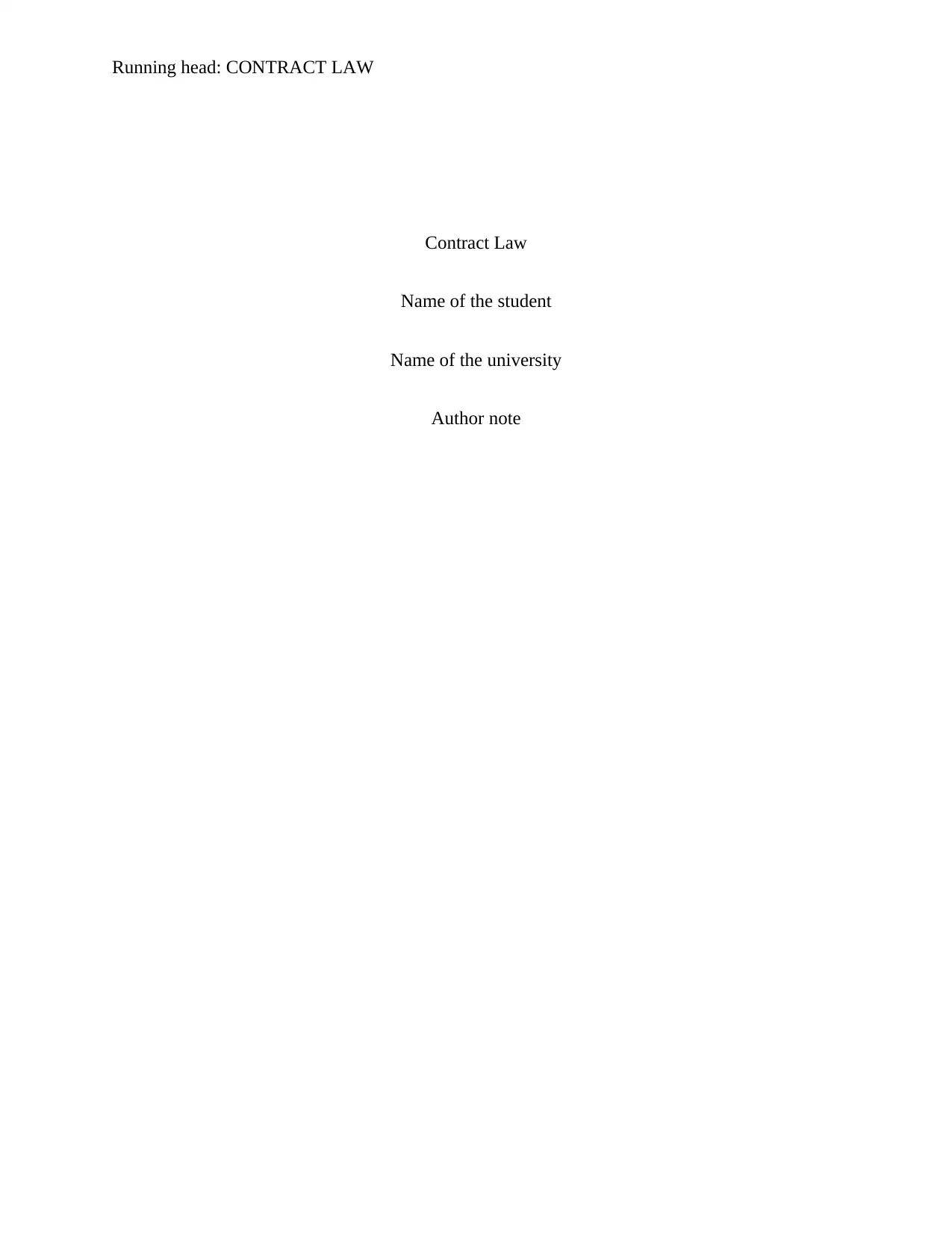
Running head: CONTRACT LAW
Contract Law
Name of the student
Name of the university
Author note
Contract Law
Name of the student
Name of the university
Author note
Paraphrase This Document
Need a fresh take? Get an instant paraphrase of this document with our AI Paraphraser
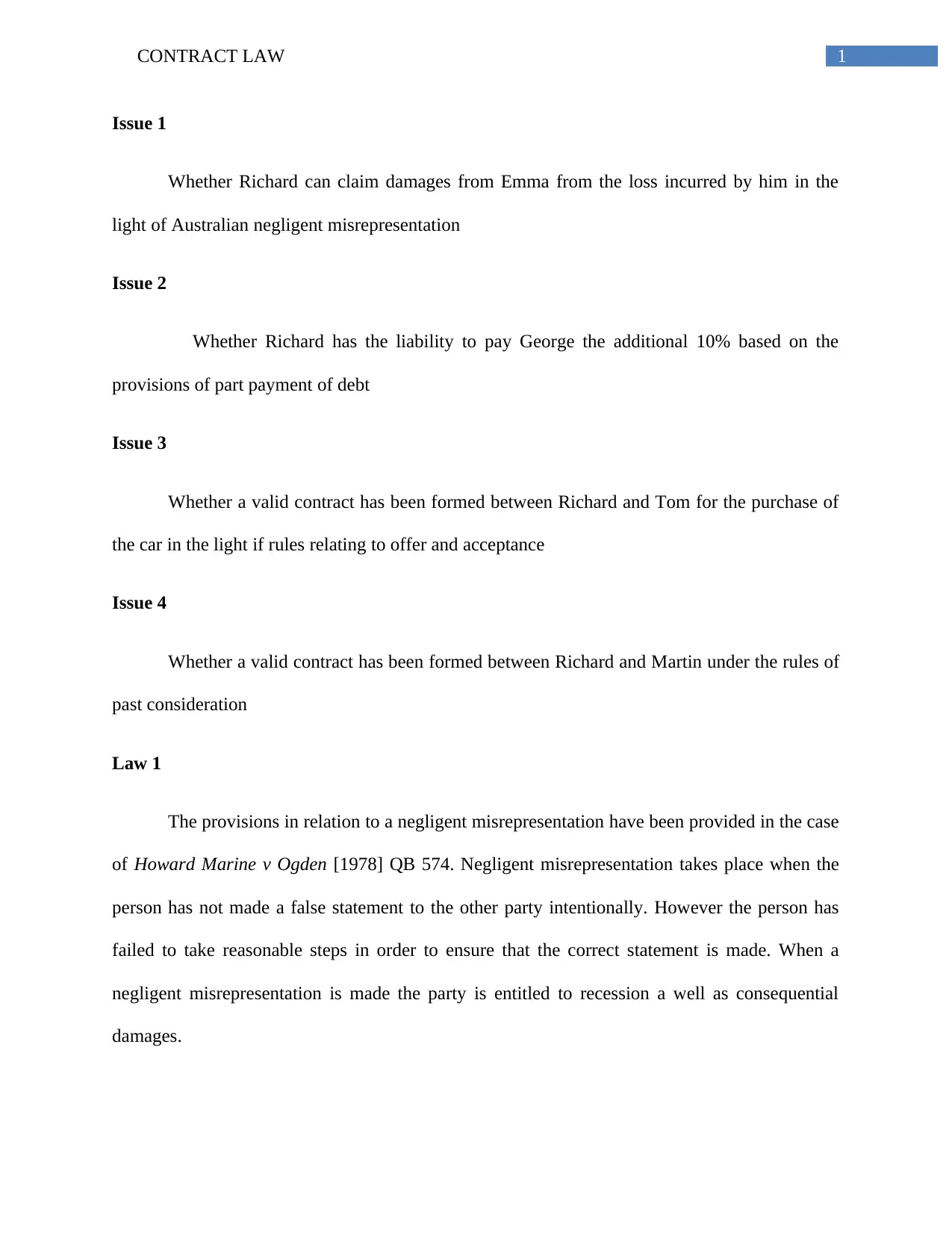
1CONTRACT LAW
Issue 1
Whether Richard can claim damages from Emma from the loss incurred by him in the
light of Australian negligent misrepresentation
Issue 2
Whether Richard has the liability to pay George the additional 10% based on the
provisions of part payment of debt
Issue 3
Whether a valid contract has been formed between Richard and Tom for the purchase of
the car in the light if rules relating to offer and acceptance
Issue 4
Whether a valid contract has been formed between Richard and Martin under the rules of
past consideration
Law 1
The provisions in relation to a negligent misrepresentation have been provided in the case
of Howard Marine v Ogden [1978] QB 574. Negligent misrepresentation takes place when the
person has not made a false statement to the other party intentionally. However the person has
failed to take reasonable steps in order to ensure that the correct statement is made. When a
negligent misrepresentation is made the party is entitled to recession a well as consequential
damages.
Issue 1
Whether Richard can claim damages from Emma from the loss incurred by him in the
light of Australian negligent misrepresentation
Issue 2
Whether Richard has the liability to pay George the additional 10% based on the
provisions of part payment of debt
Issue 3
Whether a valid contract has been formed between Richard and Tom for the purchase of
the car in the light if rules relating to offer and acceptance
Issue 4
Whether a valid contract has been formed between Richard and Martin under the rules of
past consideration
Law 1
The provisions in relation to a negligent misrepresentation have been provided in the case
of Howard Marine v Ogden [1978] QB 574. Negligent misrepresentation takes place when the
person has not made a false statement to the other party intentionally. However the person has
failed to take reasonable steps in order to ensure that the correct statement is made. When a
negligent misrepresentation is made the party is entitled to recession a well as consequential
damages.
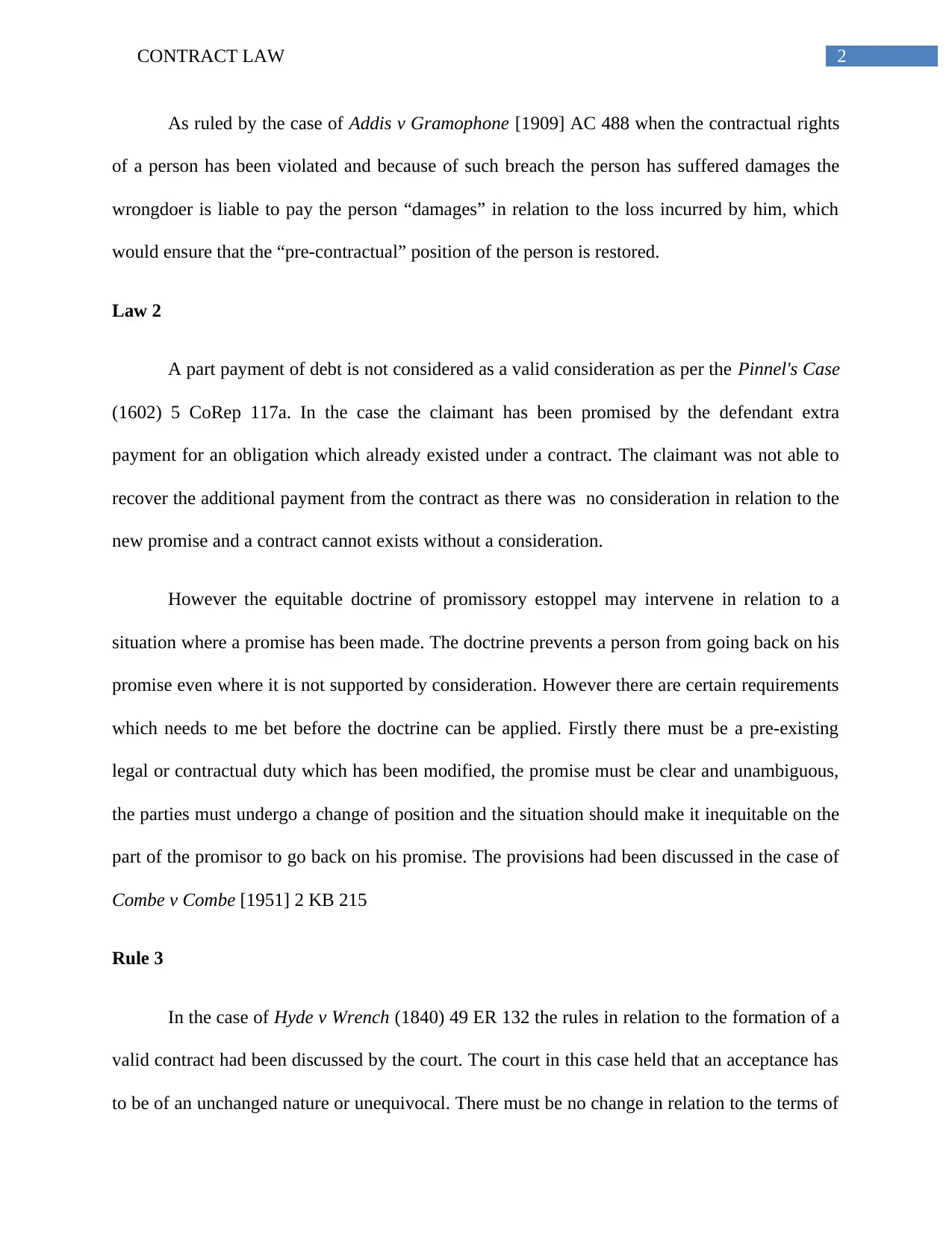
2CONTRACT LAW
As ruled by the case of Addis v Gramophone [1909] AC 488 when the contractual rights
of a person has been violated and because of such breach the person has suffered damages the
wrongdoer is liable to pay the person “damages” in relation to the loss incurred by him, which
would ensure that the “pre-contractual” position of the person is restored.
Law 2
A part payment of debt is not considered as a valid consideration as per the Pinnel's Case
(1602) 5 CoRep 117a. In the case the claimant has been promised by the defendant extra
payment for an obligation which already existed under a contract. The claimant was not able to
recover the additional payment from the contract as there was no consideration in relation to the
new promise and a contract cannot exists without a consideration.
However the equitable doctrine of promissory estoppel may intervene in relation to a
situation where a promise has been made. The doctrine prevents a person from going back on his
promise even where it is not supported by consideration. However there are certain requirements
which needs to me bet before the doctrine can be applied. Firstly there must be a pre-existing
legal or contractual duty which has been modified, the promise must be clear and unambiguous,
the parties must undergo a change of position and the situation should make it inequitable on the
part of the promisor to go back on his promise. The provisions had been discussed in the case of
Combe v Combe [1951] 2 KB 215
Rule 3
In the case of Hyde v Wrench (1840) 49 ER 132 the rules in relation to the formation of a
valid contract had been discussed by the court. The court in this case held that an acceptance has
to be of an unchanged nature or unequivocal. There must be no change in relation to the terms of
As ruled by the case of Addis v Gramophone [1909] AC 488 when the contractual rights
of a person has been violated and because of such breach the person has suffered damages the
wrongdoer is liable to pay the person “damages” in relation to the loss incurred by him, which
would ensure that the “pre-contractual” position of the person is restored.
Law 2
A part payment of debt is not considered as a valid consideration as per the Pinnel's Case
(1602) 5 CoRep 117a. In the case the claimant has been promised by the defendant extra
payment for an obligation which already existed under a contract. The claimant was not able to
recover the additional payment from the contract as there was no consideration in relation to the
new promise and a contract cannot exists without a consideration.
However the equitable doctrine of promissory estoppel may intervene in relation to a
situation where a promise has been made. The doctrine prevents a person from going back on his
promise even where it is not supported by consideration. However there are certain requirements
which needs to me bet before the doctrine can be applied. Firstly there must be a pre-existing
legal or contractual duty which has been modified, the promise must be clear and unambiguous,
the parties must undergo a change of position and the situation should make it inequitable on the
part of the promisor to go back on his promise. The provisions had been discussed in the case of
Combe v Combe [1951] 2 KB 215
Rule 3
In the case of Hyde v Wrench (1840) 49 ER 132 the rules in relation to the formation of a
valid contract had been discussed by the court. The court in this case held that an acceptance has
to be of an unchanged nature or unequivocal. There must be no change in relation to the terms of
⊘ This is a preview!⊘
Do you want full access?
Subscribe today to unlock all pages.

Trusted by 1+ million students worldwide
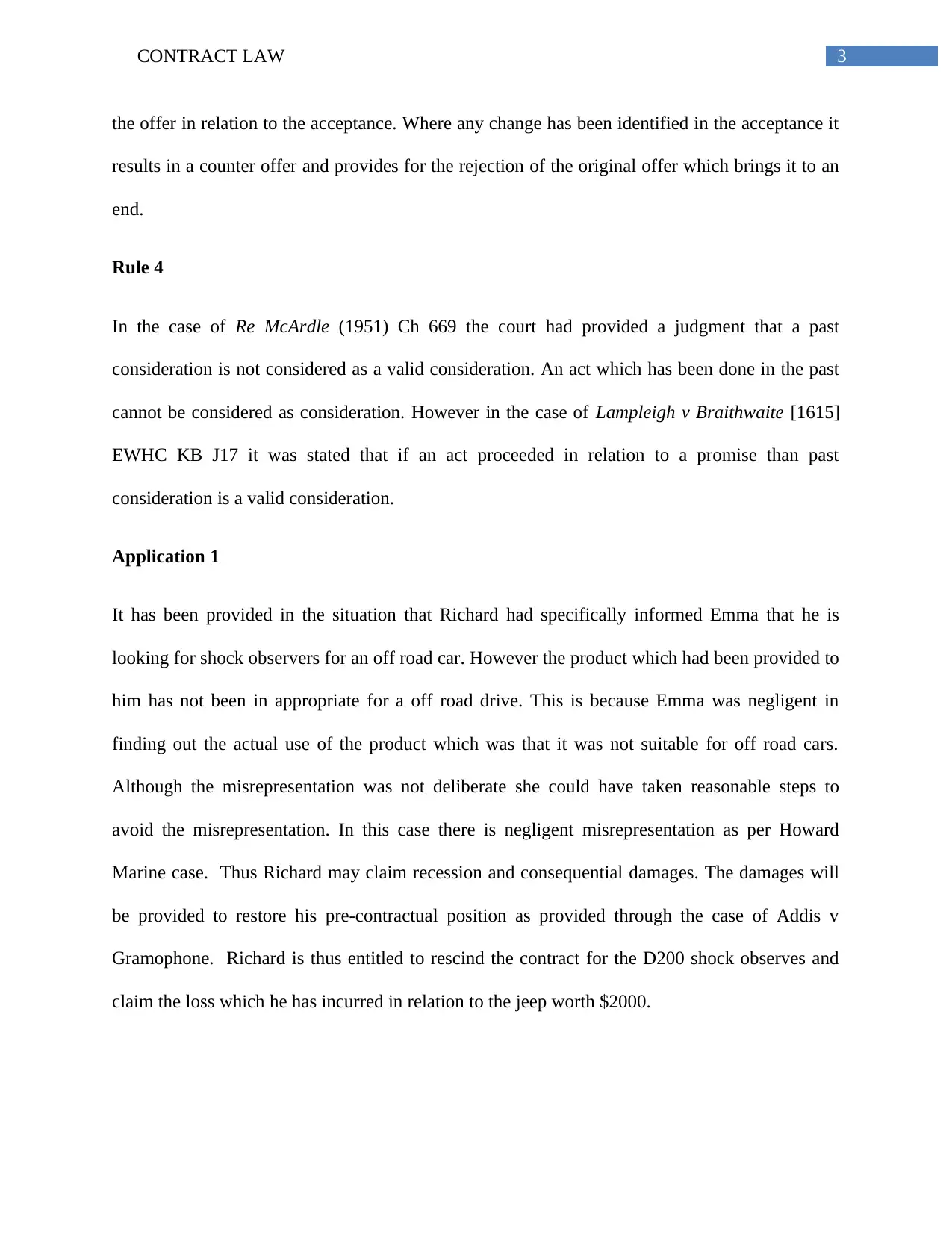
3CONTRACT LAW
the offer in relation to the acceptance. Where any change has been identified in the acceptance it
results in a counter offer and provides for the rejection of the original offer which brings it to an
end.
Rule 4
In the case of Re McArdle (1951) Ch 669 the court had provided a judgment that a past
consideration is not considered as a valid consideration. An act which has been done in the past
cannot be considered as consideration. However in the case of Lampleigh v Braithwaite [1615]
EWHC KB J17 it was stated that if an act proceeded in relation to a promise than past
consideration is a valid consideration.
Application 1
It has been provided in the situation that Richard had specifically informed Emma that he is
looking for shock observers for an off road car. However the product which had been provided to
him has not been in appropriate for a off road drive. This is because Emma was negligent in
finding out the actual use of the product which was that it was not suitable for off road cars.
Although the misrepresentation was not deliberate she could have taken reasonable steps to
avoid the misrepresentation. In this case there is negligent misrepresentation as per Howard
Marine case. Thus Richard may claim recession and consequential damages. The damages will
be provided to restore his pre-contractual position as provided through the case of Addis v
Gramophone. Richard is thus entitled to rescind the contract for the D200 shock observes and
claim the loss which he has incurred in relation to the jeep worth $2000.
the offer in relation to the acceptance. Where any change has been identified in the acceptance it
results in a counter offer and provides for the rejection of the original offer which brings it to an
end.
Rule 4
In the case of Re McArdle (1951) Ch 669 the court had provided a judgment that a past
consideration is not considered as a valid consideration. An act which has been done in the past
cannot be considered as consideration. However in the case of Lampleigh v Braithwaite [1615]
EWHC KB J17 it was stated that if an act proceeded in relation to a promise than past
consideration is a valid consideration.
Application 1
It has been provided in the situation that Richard had specifically informed Emma that he is
looking for shock observers for an off road car. However the product which had been provided to
him has not been in appropriate for a off road drive. This is because Emma was negligent in
finding out the actual use of the product which was that it was not suitable for off road cars.
Although the misrepresentation was not deliberate she could have taken reasonable steps to
avoid the misrepresentation. In this case there is negligent misrepresentation as per Howard
Marine case. Thus Richard may claim recession and consequential damages. The damages will
be provided to restore his pre-contractual position as provided through the case of Addis v
Gramophone. Richard is thus entitled to rescind the contract for the D200 shock observes and
claim the loss which he has incurred in relation to the jeep worth $2000.
Paraphrase This Document
Need a fresh take? Get an instant paraphrase of this document with our AI Paraphraser
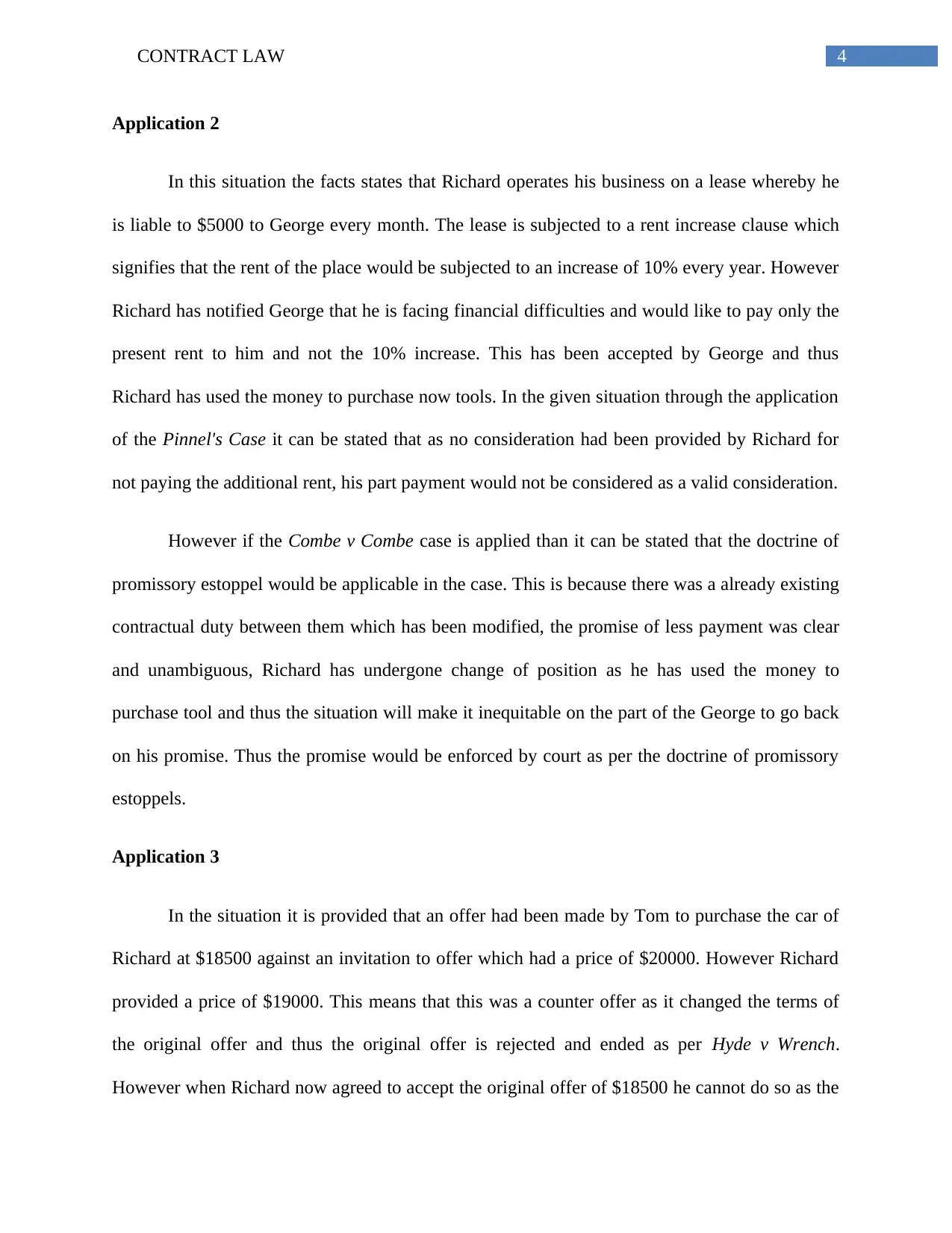
4CONTRACT LAW
Application 2
In this situation the facts states that Richard operates his business on a lease whereby he
is liable to $5000 to George every month. The lease is subjected to a rent increase clause which
signifies that the rent of the place would be subjected to an increase of 10% every year. However
Richard has notified George that he is facing financial difficulties and would like to pay only the
present rent to him and not the 10% increase. This has been accepted by George and thus
Richard has used the money to purchase now tools. In the given situation through the application
of the Pinnel's Case it can be stated that as no consideration had been provided by Richard for
not paying the additional rent, his part payment would not be considered as a valid consideration.
However if the Combe v Combe case is applied than it can be stated that the doctrine of
promissory estoppel would be applicable in the case. This is because there was a already existing
contractual duty between them which has been modified, the promise of less payment was clear
and unambiguous, Richard has undergone change of position as he has used the money to
purchase tool and thus the situation will make it inequitable on the part of the George to go back
on his promise. Thus the promise would be enforced by court as per the doctrine of promissory
estoppels.
Application 3
In the situation it is provided that an offer had been made by Tom to purchase the car of
Richard at $18500 against an invitation to offer which had a price of $20000. However Richard
provided a price of $19000. This means that this was a counter offer as it changed the terms of
the original offer and thus the original offer is rejected and ended as per Hyde v Wrench.
However when Richard now agreed to accept the original offer of $18500 he cannot do so as the
Application 2
In this situation the facts states that Richard operates his business on a lease whereby he
is liable to $5000 to George every month. The lease is subjected to a rent increase clause which
signifies that the rent of the place would be subjected to an increase of 10% every year. However
Richard has notified George that he is facing financial difficulties and would like to pay only the
present rent to him and not the 10% increase. This has been accepted by George and thus
Richard has used the money to purchase now tools. In the given situation through the application
of the Pinnel's Case it can be stated that as no consideration had been provided by Richard for
not paying the additional rent, his part payment would not be considered as a valid consideration.
However if the Combe v Combe case is applied than it can be stated that the doctrine of
promissory estoppel would be applicable in the case. This is because there was a already existing
contractual duty between them which has been modified, the promise of less payment was clear
and unambiguous, Richard has undergone change of position as he has used the money to
purchase tool and thus the situation will make it inequitable on the part of the George to go back
on his promise. Thus the promise would be enforced by court as per the doctrine of promissory
estoppels.
Application 3
In the situation it is provided that an offer had been made by Tom to purchase the car of
Richard at $18500 against an invitation to offer which had a price of $20000. However Richard
provided a price of $19000. This means that this was a counter offer as it changed the terms of
the original offer and thus the original offer is rejected and ended as per Hyde v Wrench.
However when Richard now agreed to accept the original offer of $18500 he cannot do so as the
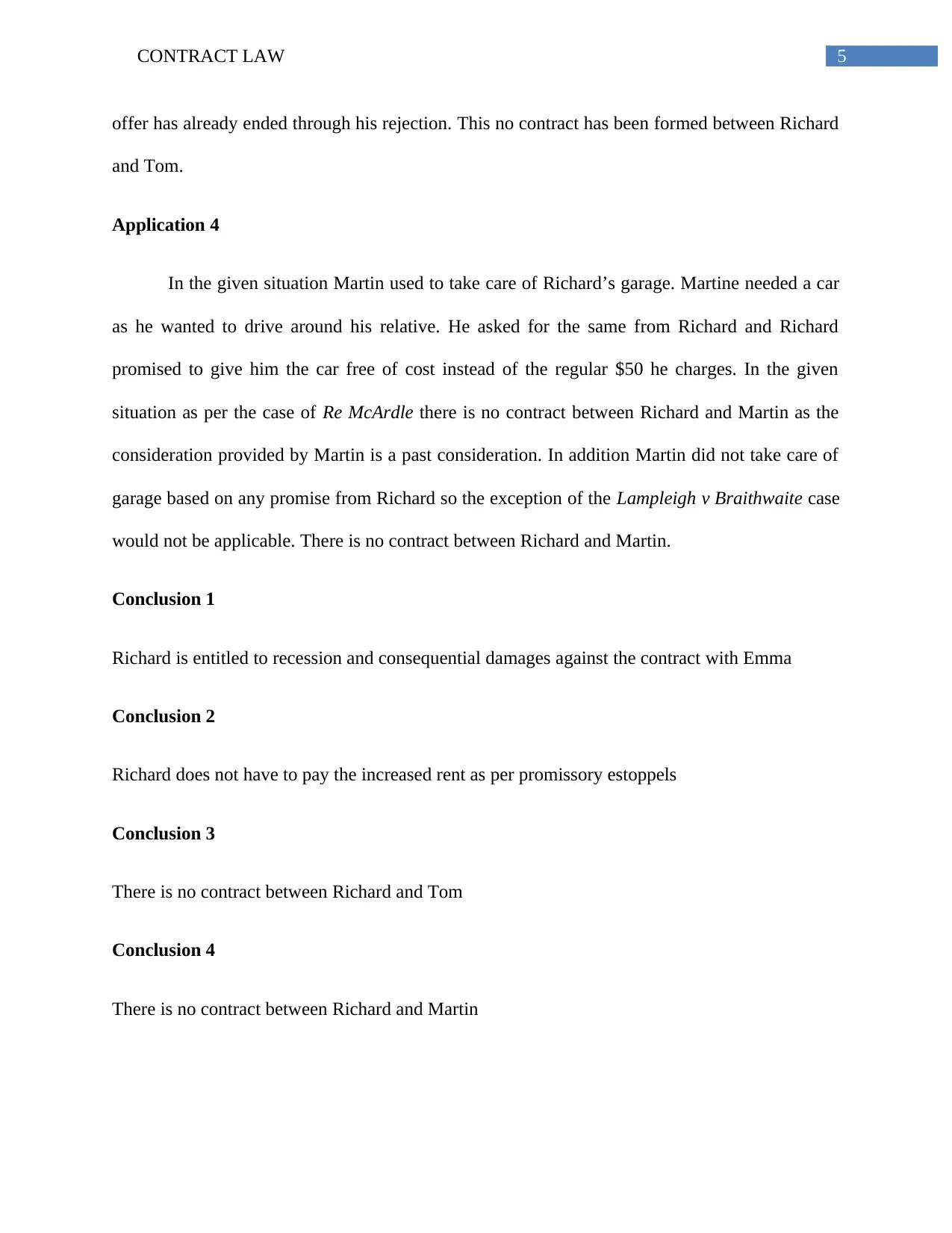
5CONTRACT LAW
offer has already ended through his rejection. This no contract has been formed between Richard
and Tom.
Application 4
In the given situation Martin used to take care of Richard’s garage. Martine needed a car
as he wanted to drive around his relative. He asked for the same from Richard and Richard
promised to give him the car free of cost instead of the regular $50 he charges. In the given
situation as per the case of Re McArdle there is no contract between Richard and Martin as the
consideration provided by Martin is a past consideration. In addition Martin did not take care of
garage based on any promise from Richard so the exception of the Lampleigh v Braithwaite case
would not be applicable. There is no contract between Richard and Martin.
Conclusion 1
Richard is entitled to recession and consequential damages against the contract with Emma
Conclusion 2
Richard does not have to pay the increased rent as per promissory estoppels
Conclusion 3
There is no contract between Richard and Tom
Conclusion 4
There is no contract between Richard and Martin
offer has already ended through his rejection. This no contract has been formed between Richard
and Tom.
Application 4
In the given situation Martin used to take care of Richard’s garage. Martine needed a car
as he wanted to drive around his relative. He asked for the same from Richard and Richard
promised to give him the car free of cost instead of the regular $50 he charges. In the given
situation as per the case of Re McArdle there is no contract between Richard and Martin as the
consideration provided by Martin is a past consideration. In addition Martin did not take care of
garage based on any promise from Richard so the exception of the Lampleigh v Braithwaite case
would not be applicable. There is no contract between Richard and Martin.
Conclusion 1
Richard is entitled to recession and consequential damages against the contract with Emma
Conclusion 2
Richard does not have to pay the increased rent as per promissory estoppels
Conclusion 3
There is no contract between Richard and Tom
Conclusion 4
There is no contract between Richard and Martin
⊘ This is a preview!⊘
Do you want full access?
Subscribe today to unlock all pages.

Trusted by 1+ million students worldwide

6CONTRACT LAW
References
Addis v Gramophone [1909] AC 488
Combe v Combe [1951] 2 KB 215
Howard Marine v Ogden [1978] QB 574
Hyde v Wrench (1840) 49 ER 132
Lampleigh v Braithwaite [1615] EWHC KB J17
Pinnel's Case (1602) 5 CoRep 117a
Re McArdle (1951) Ch 669
References
Addis v Gramophone [1909] AC 488
Combe v Combe [1951] 2 KB 215
Howard Marine v Ogden [1978] QB 574
Hyde v Wrench (1840) 49 ER 132
Lampleigh v Braithwaite [1615] EWHC KB J17
Pinnel's Case (1602) 5 CoRep 117a
Re McArdle (1951) Ch 669
1 out of 7
Related Documents
Your All-in-One AI-Powered Toolkit for Academic Success.
+13062052269
info@desklib.com
Available 24*7 on WhatsApp / Email
![[object Object]](/_next/static/media/star-bottom.7253800d.svg)
Unlock your academic potential
Copyright © 2020–2026 A2Z Services. All Rights Reserved. Developed and managed by ZUCOL.




